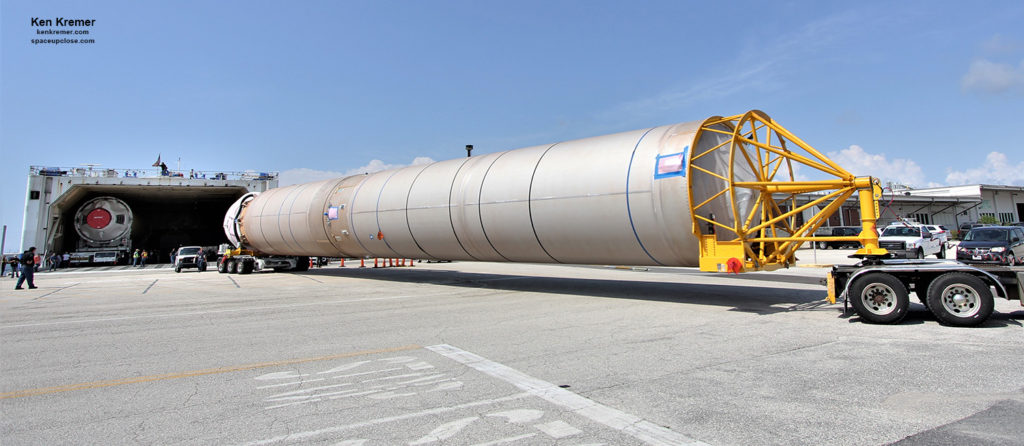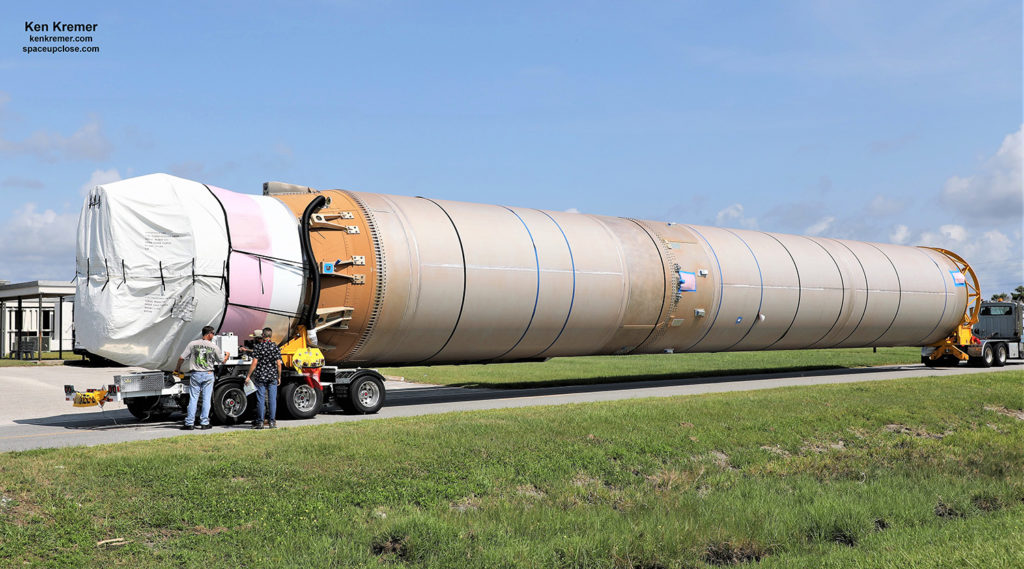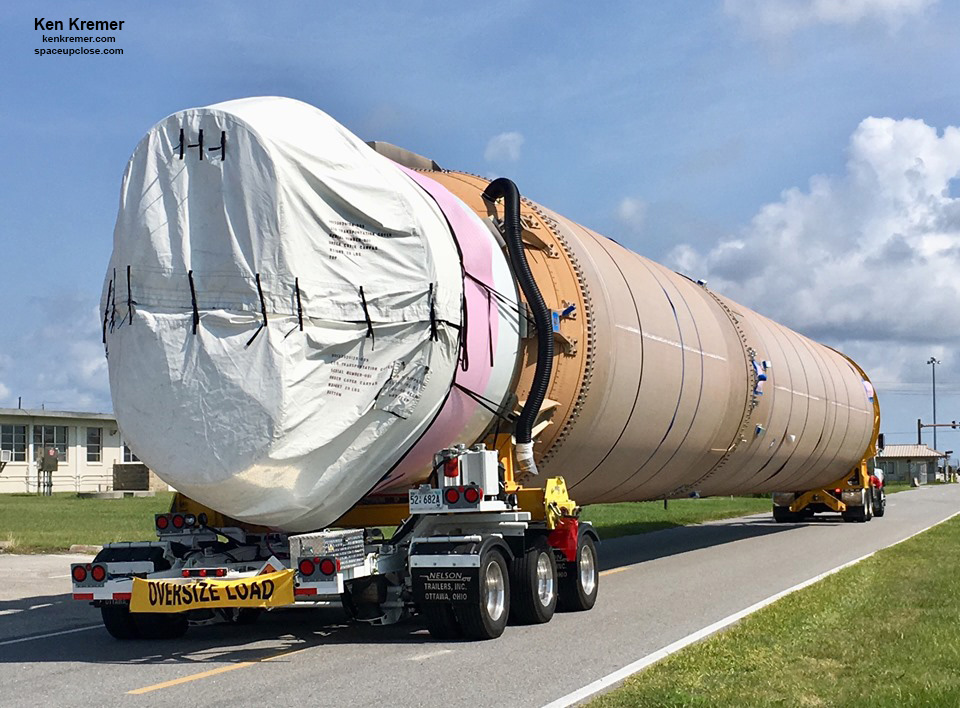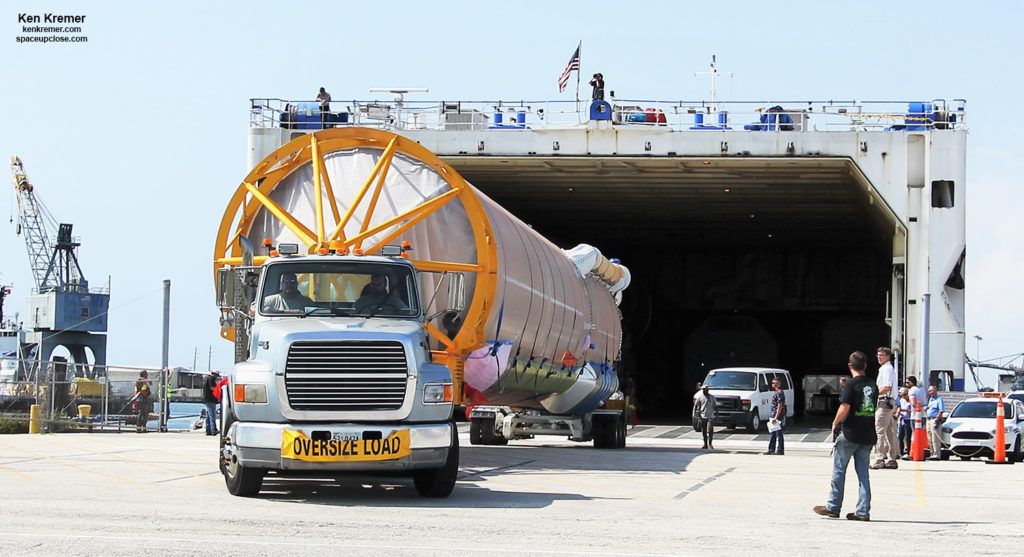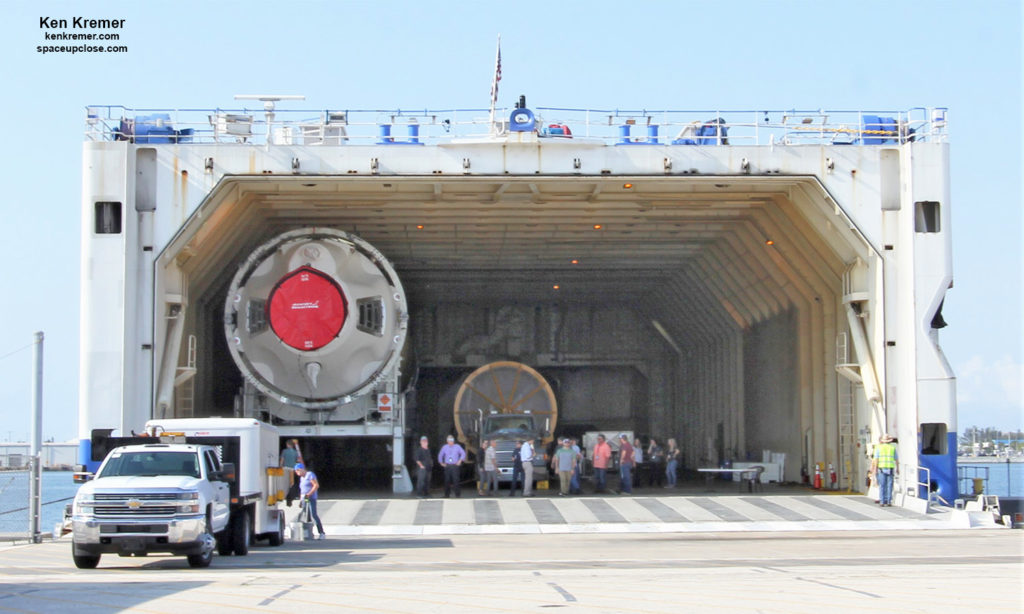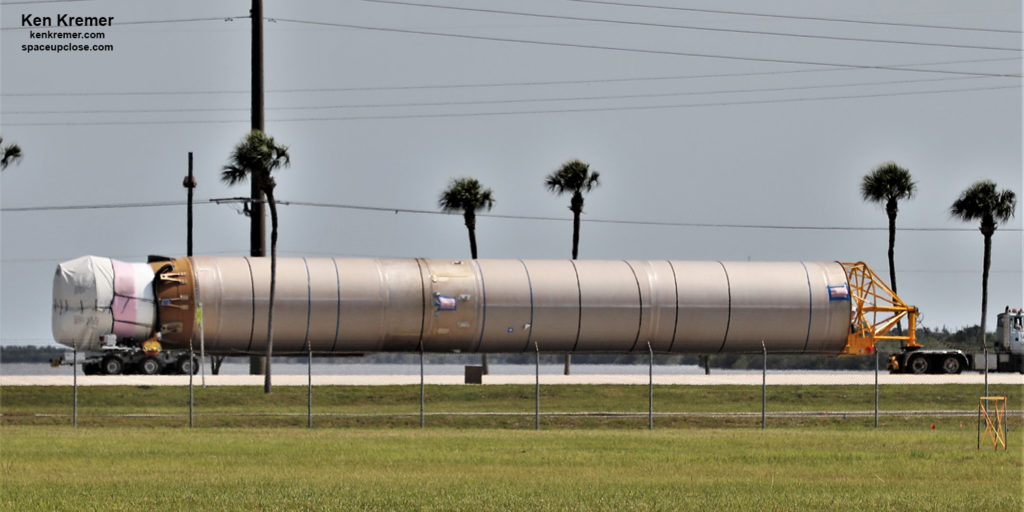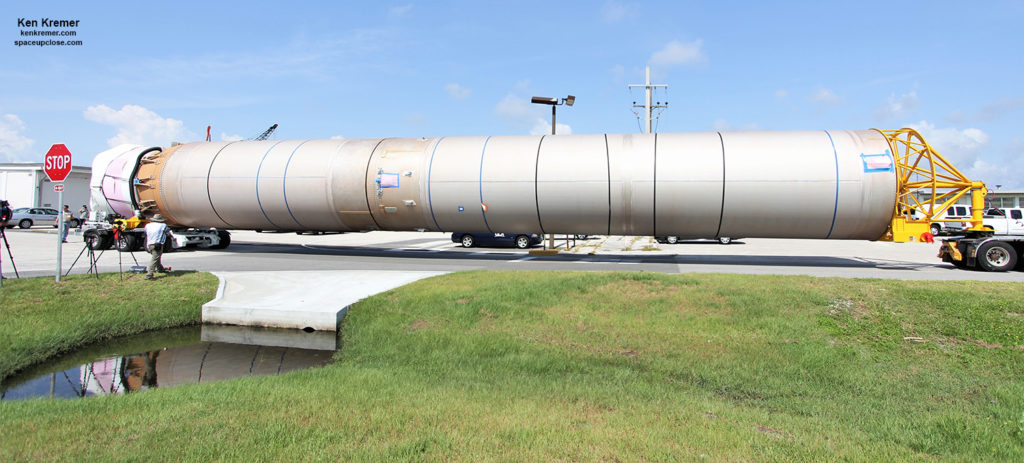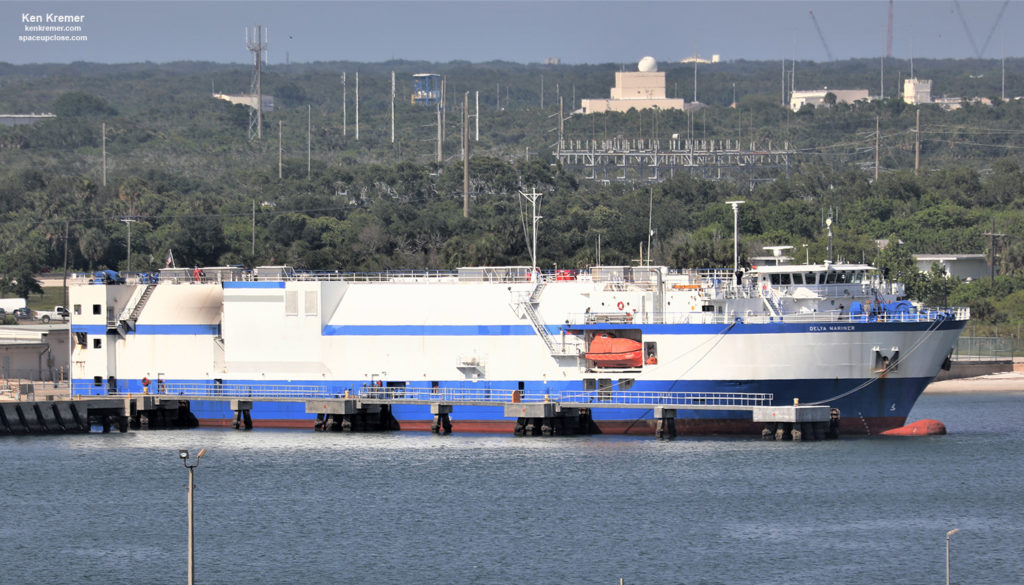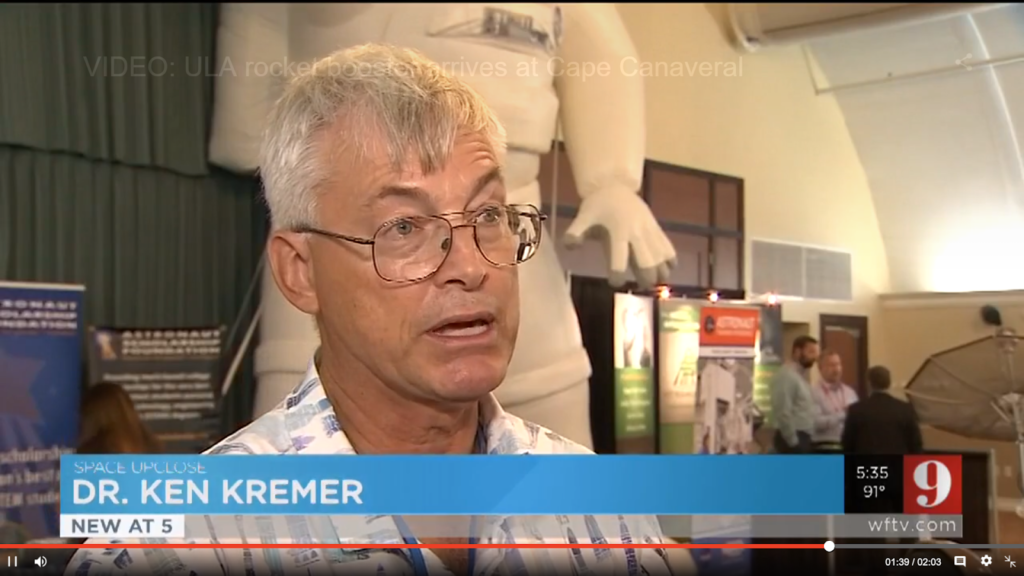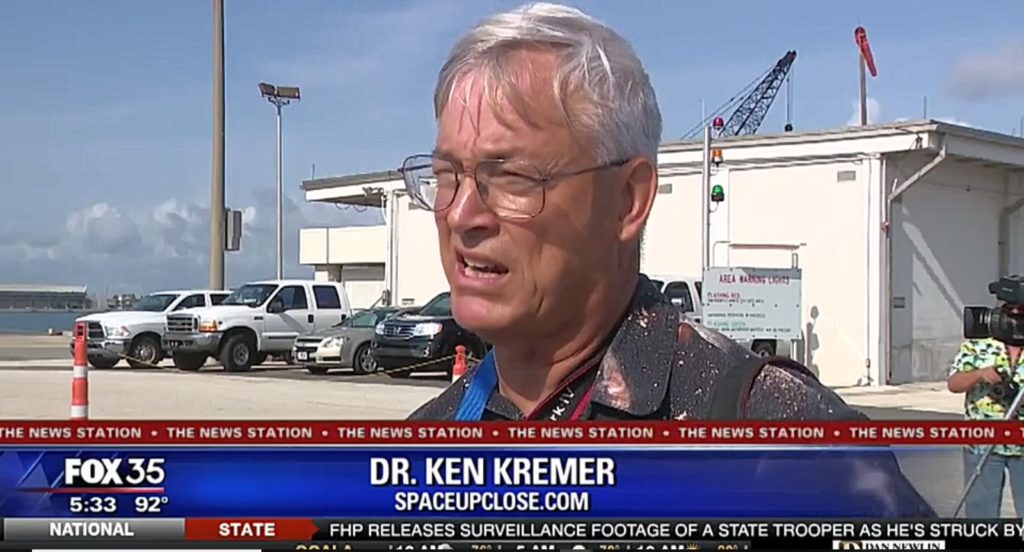Ken
Kremer — SpaceUpClose.com &
RocketSTEM – 5 June 2019
CAPE
CANAVERAL AIR FORCE STATION/PORT CANAVERAL, FL – The
1st United Launch Alliance (ULA) Atlas V rocket that will voyage to
space with humans with the 1st crew of NASA astronauts on the 1st Boeing Starliner commercial crew capsule later this year has arrived at the Cape
Canaveral launch site after a voyage by sea from Alabama.
The
10 story tall copper colored Atlas V first stage was offloaded from the ULA Delta
Mariner cargo ship around 10 a.m. EDT this morning Wednesday June 5 as the media
including Space UpClose witnessed first hand.
The
milestone mission dubbed the Crew Flight Test or CFT could blast off for
destination International Space Station (ISS) with three astronauts as soon as
November 2019 as part NASA’s Commercial Crew Program to resume human spaceflight
launches from American soil on American rockets in an American capsule.
Both
stages of the ULA Atlas V rocket designated AV-082 and comprising the first
stage and the Dual Engine Centaur (DEC) upper stage sailed to Port Canaveral June 1 aboard the Delta Mariner cargo ship after departing from the ULA manufacturing facility
in Decatur, Alabama.
Enjoy our eyewitness Space UpClose photo gallery of the
Atlas V rocket arrival and roll off from the Delta Mariner on a carrier cradle pulled
by a truck.
duty protective tarp to shield the dual Russian made RD-180 engines (that propel
it to space) in secrecy from our cameras – and also more importantly to shield them
from debris like kicked up stones and grass that could clog or damage the engines and
plumbing and cause catastrophic failures from FOD or Foreign Object Debris.
Delta Mariner departed Decatur on May 23 “for the
journey that spanned rivers, the Gulf of Mexico and Atlantic Ocean to reach
Port Canaveral for berthing at the unloading wharf,” said ULA.
June 1 and sailed past Jetty Park Pier around 7 a.m. See our photos in port.
Dual Engine Centaur was offloaded first on Monday on a carrier cradle.
After
Wednesday’s 1st stage off loading from the Delta Mariner it passed
through the security gates of Cape Canaveral Air Force Station and was
transported to the Atlas Spaceflight
Operations Center (ASOC) for processing at ULA launch site at Space Launch Complex-41 (SLC-41). See our photos.
checks and await the start of operations for its mission to send three
astronauts to the station on the Crew Test Flight (CFT) of Starliner,” ULA said
in a blog post.
The ULA Atlas V will blastoff from
Space Launch Complex-41 on Cape Canaveral Air Force Station, FL.
The first Boeing Starliner to launch
will be uncrewed with no astronauts aboard on the Orbital Flight Test (OFT)
mission – set for as soon as around August 17.
OFT will serve as a full dress rehearsal
test flight to the ISS and back.
The crew trio on the CFT mission will comprise Boeing
astronaut and former NASA astronaut
Chris Ferguson and
NASA astronauts Mike Fincke and Nicole Mann who will fully demonstrate Starliner and Atlas V’s
ability to safely carry crew to and from the orbiting laboratory.
Under
contracts with NASA, both Boeing and SpaceX are competing to be the first
private company to launch the 1st Americans to low Earth orbit in
nearly eight years since NASA’s space shuttle orbiters were forcibly retired
back in 2011.
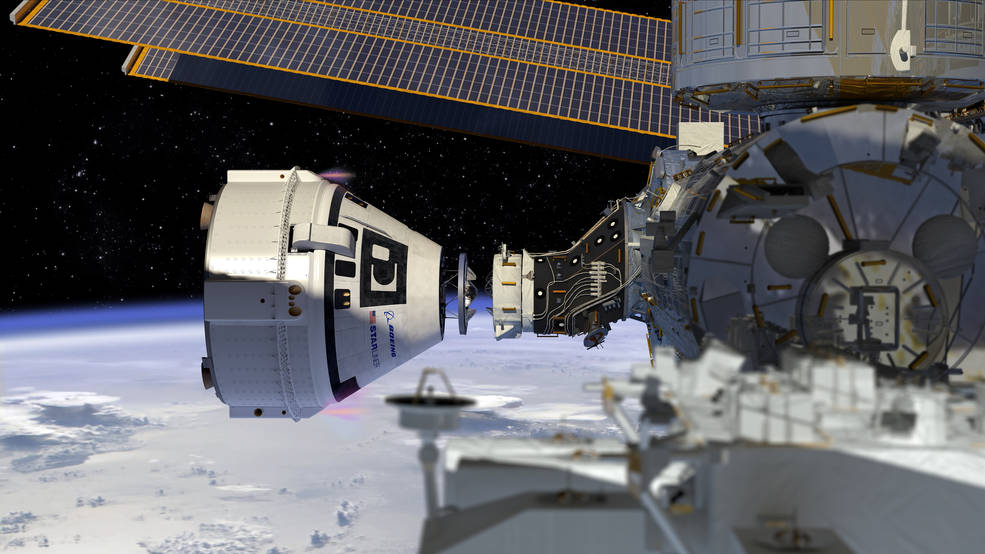 |
|
Artists concept of Boeing Starliner commercial crew vehicle
arriving at the International Space Station. Credit: Boeing/NASA |
SpaceX is also developing the Crew Dragon to ferry NASA astronauts
to and from the ISS.
“As commercial crew providers, Boeing and
SpaceX, begin to make regular flights to the space station, NASA will continue
to advance its mission to go beyond low-Earth orbit and establish a human
presence on the Moon with the ultimate goal of sending astronauts to Mars, says
NASA.
Boeing
engineers recently completed a lengthy series of hot fire tests on the
propulsion system of Starliner crew test article involving the vehicle’s in-space maneuvering system as well as the
critical launch abort system that will help pave the way to the first test
flight with astronauts in support of NASA’s Commercial Crew Program. Read our prior
story.
Watch my commentary at ABC and
Fox local TV News Orlando about the Atlas V arrival and offloading and the future
of astronauts rising to space aboard Boeing Starliner crew capsule at these stories
from June 5 here:
Watch for Ken’s continuing
onsite coverage of NASA, SpaceX, ULA, Boeing, Lockheed Martin, Northrop Grumman
and more space and mission reports direct from the Kennedy Space Center, Cape
Canaveral Air Force Station, Florida and Wallops Flight Facility, Virginia.
Stay tuned here for Ken’s continuing Earth and
Planetary science and human spaceflight news: www.kenkremer.com –www.spaceupclose.com – twitter @ken_kremer
– email: ken at kenkremer.com
Dr. Kremer is a research scientist and journalist based in the
KSC area, active in outreach and interviewed regularly on TV and radio about
space topics.
………….
Ken’s photos are for sale and he is available for lectures and outreach events


